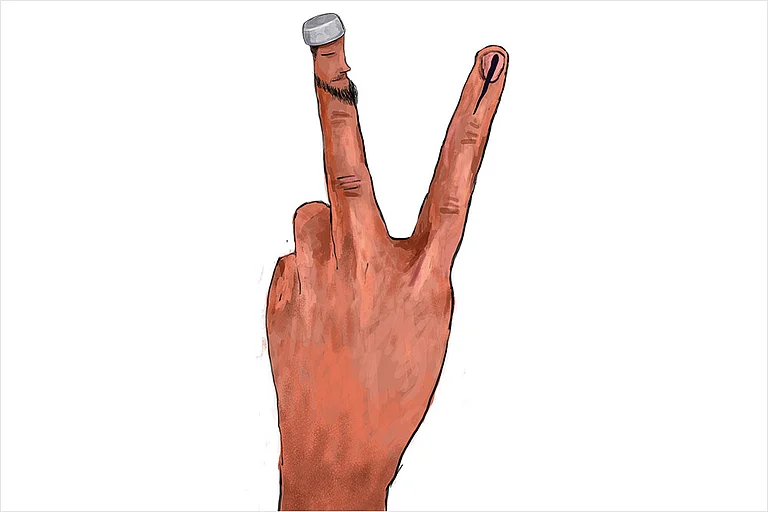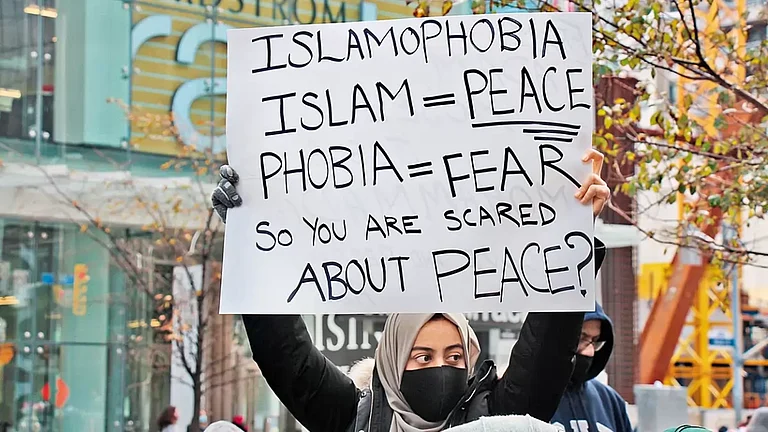For Madrasa Aadhunikaran Shikshak Ekta Samiti UP state president Ashraf Ali, the recent Supreme Court stay on the recommendations of the National Commission for Protection of Child Rights (NCPCR) regarding madrasas brought a glimmer of hope.
In UP Madrasas, A Tussle Between Right To Education And Access To Education
Madrasas are often the only chance at education for most of the thousands of students enrolled in them
The NCPCR's recommendations in June had stated that madrasas were not complying with Right To Education rules, and directed the UP government to admit non-Muslim students to formal education schools. These recommendations had come on the heels of the Allahabad High Court striking down the UP Board of Madrasa Education Act, 2004, in March this year, and ordering the state to accommodate students in government schools, creating uncertainty and fear among students, parents, and teachers. The court in March said the act was "unconstitutional" and violative of the principle of secularism. It said a state had no power to create a board for religious education or establish a school for a particular religion and their ideology.
The Act passed in 2004 had provided a framework for the establishment, recognition, curriculum, and administration of madrasas across Uttar Pradesh.
“The state-recognised madrasas were asked to have the non-Muslim students moved to government schools and the non-recognised madrasas were asked to close down and students were to be moved to government schools,” Ashraf Ali, who is a Hindi teacher at a madrasa in Bahraich, told Outlook.
The High Court order triggered a strong wave of condemnation within the madrasa community, he says, with petitions filed immediately to appeal the decision in the Supreme Court. The decision was stayed by the SC in April.
“Because the Supreme Court stayed the decision, the operations continued as normal. However, we still didn’t know what would happen eventually and it has unsettled us,” said Ali.
Uttar Pradesh is among the states with the largest number of madrasas in India. There are 16,513 recognised madrasas, out of which 560 are government-aided. The number of unrecognised madrasas is over 8,400.
The madrasas, Ali says, are the only chance at education for most of the thousands of students enrolled in them. “In remote village areas where there is no provision of government schools at an accessible distance, even non-Muslim children come to madrasas. They never had any problems with the madrasa curriculum or how it was taught. And of course the economic factor is there, most students are poor and cannot afford to go anywhere else.”
He adds that transfer of students from madrasas to government schools would have proved to be a cumbersome task, almost bordering on impossible.
“Even the government knows that the accommodation of so many madrasa students in government schools would not have been possible.”
During the hearing of petitions challenging the striking down of the Madrasa Act, Additional Solicitor General K.M. Nataraj, representing UP, argued in favour of the Act. He mentioned that he had previously done the same in the High Court but had not questioned the court’s judgement. “The High Court should not have struck down the Act. It could have examined the validity of certain provisions in the light of Article 21A and Right of Children to Free and Compulsory Education Act, 2009,” he said on Tuesday.
The High Court, in its March judgement, stated the main reason for striking down the Act was the government's violation of the Right To Education by denying "quality" education in modern subjects and failing to provide secular education without “religious discrimination”.
Following this, the NCPCR released communications on June 7 and 25, stating that madrasas were not complying with the RTE. They directed the UP government to admit non-Muslim students to formal education schools, and requested the Centre to ensure all states and Union Territories inspect madrasas and withdraw recognition from those not compliant with the Right to Education Act, 2009.
Chief Justice of India D.Y. Chandrachud, while hearing the case said, “ Is it in national interest to ban madrassas, or should they be mainstreamed? People will send their children to madrassas even if they are not recognised. It would be for the state to mainstream the syllabus.”
However, Ashraf Ali notes that the condition of madrasas has worsened over the past decade rather than improving.
In February this year, Outlook had reported on a protest involving thousands of madrasa teachers in UP demanding payment of six years worth of pending salaries under the Scheme for Providing Education to Madrasas/Minorities (SPEMM).
“The pending salaries are still pending,” Ali said. “Yesterday the Minister of State Minority Welfare Danish Ansari met with Yogi Adityanath on the teachers’ behalf, now let’s see what happens.”
SPEMM is an umbrella scheme which contains the sub-schemes Scheme for Providing Quality Education in Madrasas (SPQEM) and Infrastructure Development of Minority Institutes (IDMI). While SPQEM focuses on integrating modern subjects like English, Hindi, maths and science to the curriculum and improving educational quality within madrasas, IDMI aims to support infrastructure development.
The scheme had been introduced as the Madrasa Modernisation Scheme in 1993, to integrate modern subjects such as Mathematics, Science, Hindi, English, and Social Studies into the madrasa students’ curriculum. As a result, teachers specialising in these modern subjects were appointed.
The scheme was renamed SPEMM in 2014-15, and teachers' salaries were set at Rs 6,000 for graduates and Rs 12,000 for postgraduates.
However, as teachers’ payments became irregular or ceased altogether, many had to take on side jobs such as providing private tuition or selling fruits and vegetables on the roadside, to make ends meet.
“We are just somehow keeping the madrasas running with almost no funding from the state,” the madrasa teacher says.
The Supreme Court of India, after hearing the arguments, has reserved its judgement in the matter concerning validity of the Madrasa Act.
Tags


